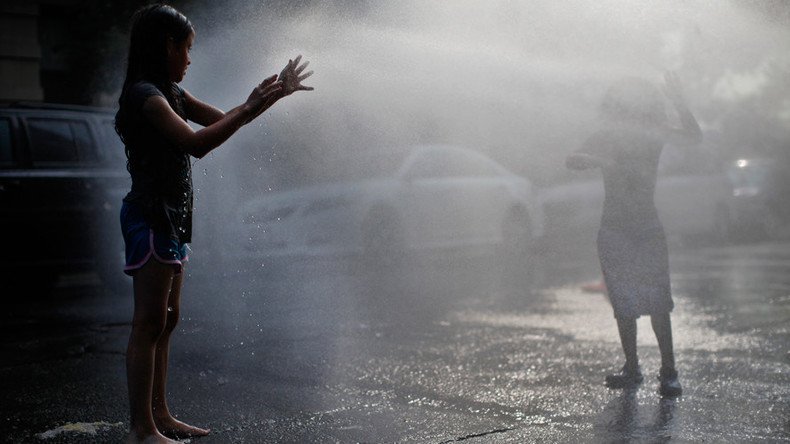Michigan governor declares state of emergency over Flint’s toxic water

Michigan Governor Rick Snyder declared a state of emergency over Flint’s contaminated drinking water. The announcement comes less than a month after Flint’s mayor declared the same, saying the city’s water was causing elevated levels of lead in children.
In announcing the state of emergency on Tuesday, Governor Snyder said that when the City of Flint switched from the Detroit water system in 2014 to the Flint River as a water source, “the harmful effects of untreated water struck the city’s water infrastructure.”
Snyder said the damaged water infrastructure caused leaching of lead into the water and damage to the water system. This, he said,“has either caused or threatened to cause elevated blood lead levels, especially in the population of children and pregnant women,”creating“a potential immediate threat to public health and safety.”
Flint poisoned water under federal investigation following disastrous cost-cutting attempt https://t.co/mwLI3MtYMwpic.twitter.com/FYuHAXI6RP
— HuffPost Politics (@HuffPostPol) January 6, 2016Snyder’s declaration makes available all state resources in cooperation with local response and recovery operations and authorizes the Michigan State Police, Emergency Management and Homeland Security Division to coordinate the state’s efforts.
“Working in full partnership with the Flint Water Advisory Task Force, all levels of government and water quality experts, we will find both short-term and long-term solutions to ensure the health and safety of Flint residents,” Snyder said.
The state of emergency could lead to a future request for federal assistance in the city’s toxic water crisis. The situation has already led to the resignation of the state’s top environmental regulator last month, after a governor-appointed task force held the state environmental agency “primarily responsible” for failure to ensure safe drinking water in Flint.
Michigan governor declares state of emergency over Flint's water problems https://t.co/In5qMTe6MGpic.twitter.com/AwxxQkxmuE
— Al Jazeera America (@ajam) January 5, 2016When Flint switched water supplies, residents immediately complained about odd tastes, smells and coloring. The situation became a full-blown crisis when, during the summer of 2015, rising levels of lead were being detected in children’s blood.
A pediatrician at the local Hurley Medical Center, Dr. Mona Hanna-Attisha told RT that the highest readings she and the state recorded for elevated blood levels in Flint were 38 micrograms per deciliter. That reading is more than seven times higher than the level classified as “elevated” by the Centers for Disease Control and Prevention (five micrograms). The CDC states there is no safe blood lead level in children.
Hanna-Attisha first revealed that lead levels in Flint children had been rising to dangerous levels in September, though her work was initially panned and dismissed by state officials, including those representing Governor Snyder.
UPDATE: Michigan's top environmental regulator resigned over the Flint water crisis https://t.co/xhajehQ8bopic.twitter.com/EqqBGrGTvE
— RT America (@RT_America) December 29, 2015Lead is a deadly neurotoxin, and exposure is especially dangerous for children, who may experience stunted growth, behavioral problems and permanently decreased IQs.
The city of Flint has been under a local emergency declaration since December 14, when Mayor Karen Weaver called on the board of commissioners to take action on the water crisis.
“The City of Flint has experienced a manmade disaster,” Weaver said in a statement announcing the state of emergency.
Flint mayor declares emergency over lead water crisis, FEMA delivers 28,000 liters of H20 https://t.co/Juu2CyBsRqpic.twitter.com/JCFxhg3GD3
— RT America (@RT_America) December 15, 2015Two months earlier, Flint switched back to the Detroit water system on October 16, and FEMA began to distribute bottled water. Despite Flint’s reconnection to the Detroit water system in October, the purity of its drinking water remains unclear.
“No one really knows the current status of lead in Flint’s water supply,” said Marc Edwards, the Virginia Tech researcher whose water testing showed dangerous levels of lead in the city’s tap water, according to the Detroit News. “We have taken the position that until Flint actually passes a round of legitimate EPA Lead and Copper Rule-monitoring, (the water) should be assumed unsafe for cooking and drinking.”
A week ago, Governor Snyder apologized to Flint residents for the state’s handling of the situation. The governor also recognized the water crisis was a more expansive a problem than could met by local resources and voluntary organizations.
Poisonous lie: Flint gov't lied about lead [VIDEO] https://t.co/0Ik7V1ggVwhttps://t.co/ARYHa2mXMj@AshleeBanks_RTpic.twitter.com/SFeK6cBAbL
— RT America (@RT_America) December 30, 2015In November, the US Environmental Protection Agency began an investigation into Flint’s water crisis. After prompting from the Michigan chapter of the American Civil Liberties Union, and on the same day as Snyder announced the state of emergency, the Justice Department said it had opened an investigation into what went wrong, according to the Huffington Post.
A spokeswoman for the US Attorney’s Office in Detroit confirmed it is helping the EPA investigate Flint’s water crisis.
“In an effort to address the concerns of Flint residents, the United States Attorney’s Office for the Eastern District of Michigan is working closely with the EPA in the investigation of the contamination of the city of Flint’s water supply,” Balaya said, according to the Detroit News.
“Our policy has always been that we neither confirm nor deny investigations; however, the nature of this situation warranted an exception to that policy.”












